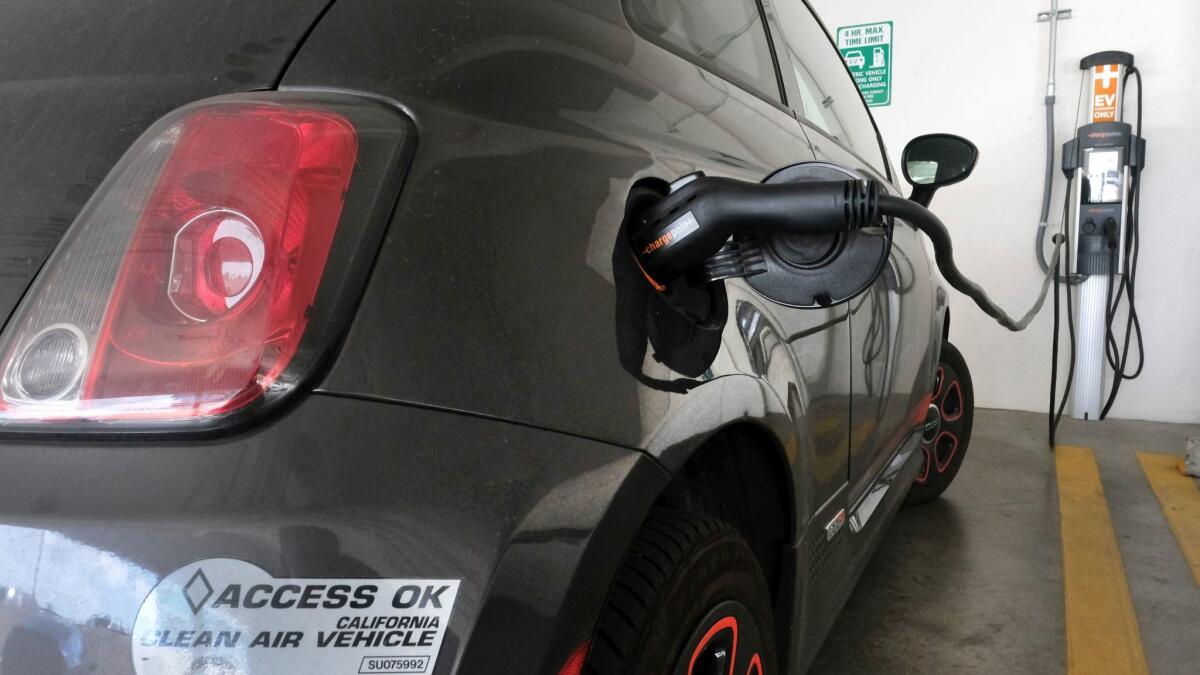Editorial: What would it take to persuade you to buy an electric car?

- Share via
Even with up to $10,000 in federal and state incentives, only 4% of car buyers in California chose electric or plug-in hybrid vehicles last year. That’s a huge problem in a state with rising greenhouse gas emissions from passenger vehicles, and with a goal to more than quadruple the number of zero-emissions vehicles on the road by 2025.
How can the state kick-start EV sales and hit its target of 1.5 million zero-emissions vehicles? To Assemblyman Phil Ting (D-San Francisco), the answer is simple: Spend $3 billion on dramatically higher state rebates — as in, upping the state’s ante from $2,500 to $10,000 or more per vehicle.
Under Ting’s proposal, AB 1184, the state rebate program would be redesigned to make the cost of a compact electric vehicle comparable to a similar gas-powered one. The bill directs the California Air Resources Board to develop the specifics, but as an example, the gap now between the Chevy Bolt EV and a base-model Honda Civic is nearly $18,000. The $7,500 federal tax credit would cut the difference to roughly $10,500, and presumably the state rebate would cover the rest. And if the federal credit runs out, the state could cover the entire $18,000.
Ting would phase out the rebates as more people buy EVs and the state approaches its 1.5-million vehicle goal. His proposal also calls for point-of-sale rebates at the car dealership, rather than requiring buyers to front the full cost of the car and wait for a rebate check, a change that by itself could juice the electric vehicle market.
But there are several problems that make Ting’s current proposal a no-go. For starters, there’s the staggering $3-billion price tag, which is six times more than the state has spent on rebates since 2010. There’s talk about dipping into the cap-and-trade auction revenue, but there already are lots of proposals for how to spend that money to reduce carbon.
More fundamentally, there’s no analysis of why Californians aren’t buying more electric cars. Is it because the financial incentives are too low, and if so, how much would be enough? Or are buyers worried about the availability of charging stations and the limited range of the first generation of EVs? Who says that even an $18,000 taxpayer-funded rebate would persuade car buyers to shift — or, conversely, that they couldn’t be convinced to do so for substantially less?
Another question is why, unlike the state’s current program, the bill would provide generous rebates to wealthy car buyers. And are Ting’s rebates targeted well enough to make the biggest carbon reductions — that is, would they get polluting cars off the road or just entice people to trade in their Prius for a Tesla?
Clearly, Californians need a stronger push to switch to electric cars. But they need the right push.
Follow the Opinion section on Twitter @latimesopinion and Facebook
More to Read
A cure for the common opinion
Get thought-provoking perspectives with our weekly newsletter.
You may occasionally receive promotional content from the Los Angeles Times.










